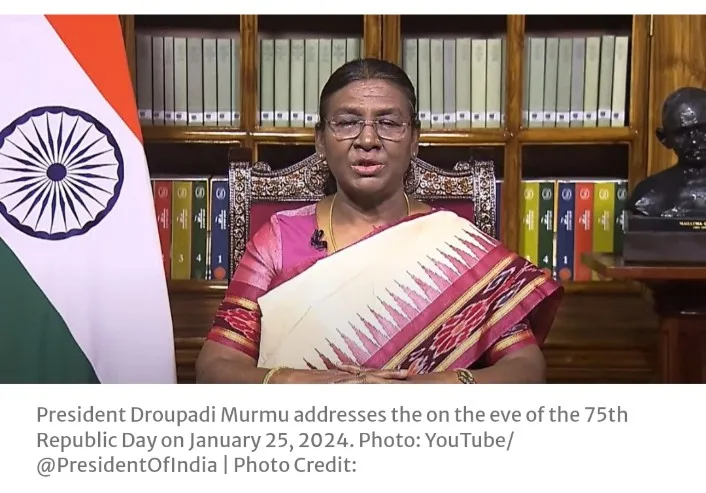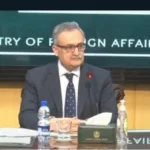In her eloquent Republic Day address on January 25, President Droupadi Murmu delivered a profound message, shedding light on various facets of India’s current landscape and its trajectory for the future.
President Murmu began by emphasizing the historic significance of the Ram temple, asserting that its construction is a pivotal moment in India’s continuous rediscovery of its rich civilizational heritage. She underscored the temple’s role as a grand edifice, not just symbolizing people’s faith but also standing as a testament to the immense trust in the judicial process, having been initiated after due legal proceedings and the decision of the highest court.
Turning her attention to global affairs, the President addressed conflicts around the world, advocating for reasoned solutions when faced with opposing perspectives. She expressed concern over the impact of fears and prejudices fueling violence, urging a commitment to reason for resolving disputes. Drawing inspiration from the teachings of Vardhaman Mahavir, Samrat Ashoka, and Mahatma Gandhi, she called for peaceful resolutions and an end to human suffering in regions marred by conflicts.
President Murmu proudly acknowledged India’s hosting of the G20 Summit, highlighting its role in amplifying India’s voice in the Global South and contributing significantly to international discourse. She commended the summit for providing valuable lessons on citizen participation in strategic and diplomatic matters.
The President delved into the economic landscape, expressing confidence in India’s forward momentum. She mentioned the ongoing Amrit Kaal, leading to the centenary of Independence, as a period of epochal transformation. In this context, she called upon citizens to adhere to fundamental duties enshrined in the Constitution, quoting Mahatma Gandhi on the inseparability of rights and duties.
Recognizing the rapid pace of technological advancements, President Murmu spoke of the integration of Artificial Intelligence and machine learning into daily life. She highlighted both the concerns and exciting opportunities these developments present, particularly for the youth exploring new frontiers. Stressing the need to remove obstacles hindering the youth, she emphasized their desire for equality of opportunity.
Turning to welfare schemes, the President lauded the government’s expansion and redefinition of the concept of welfare. She detailed the government’s measures during the pandemic, extending assistance to vulnerable populations and subsequently deciding to provide free food grains to over 81 crore people for five years, marking it as a historic welfare initiative.
President Murmu addressed humanitarian concerns, emphasizing that issues like safe drinking water and housing go beyond political or economic ideologies and should be viewed from a humanitarian perspective. She expressed hope for India to become a nation where homelessness is a rarity.
Discussing the National Education Policy, the President praised its efforts to bridge the digital divide and establish a uniform educational structure for underprivileged students. She also commended the expanding insurance cover of the Ayushman Bharat scheme, providing reassurance to the poor and vulnerable.
The President celebrated India’s strides in space exploration, acknowledging achievements such as Moon missions, Solar explorer Aditya L1, and the upcoming Gaganyaan mission. She affirmed India’s commitment to utilizing science and technology for the benefit of humanity on a global scale.
President Murmu concluded by highlighting progress toward gender equality with the passage of the Women’s Reservation Bill, envisioning positive changes in governance with increased female involvement in important decision-making processes. Her address encompassed a wide spectrum of topics, encapsulating India’s achievements, challenges, and its promising trajectory into the future.
By PTI




